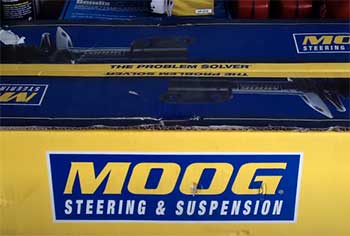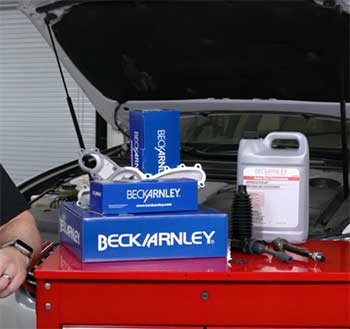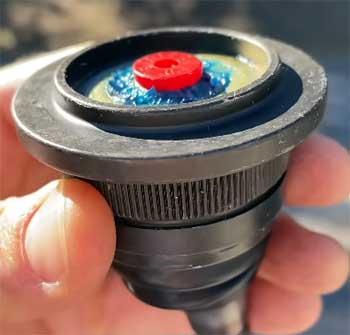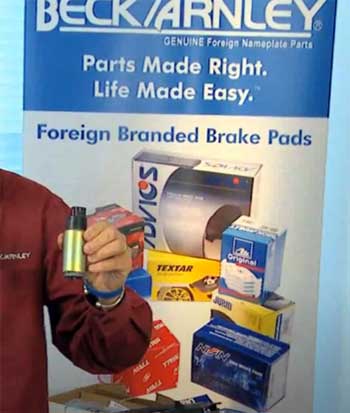I’m a car guy who’s spent countless hours under the hood, swapping out suspension parts and wrestling with ball joints. Choosing between Moog and Beck/Arnley for aftermarket auto parts is a decision I’ve faced myself, and it’s not always straightforward.
In this article, I’ll walk you through a detailed comparison of these two brands, focusing on their control arms, ball joints, and tie rod ends.
With a conversational yet analytical lens, I’ll share the pros and cons, key features, and real-world insights to help you decide which brand suits your ride best.
A Brief Comparison Table
| Feature | Moog | Beck/Arnley |
| Material Quality | Forged steel, premium coatings | Aluminum or steel, OE-grade coatings |
| Product Lines | Problem Solver (CK), Economy (RK) | OE-focused, some Sankei 555 parts |
| Durability | High, with greaseable fittings | Reliable, less serviceable |
| Fitment | Precise, OE-spec or better | Near-OE fit, some variability |
| Warranty | Lifetime on Problem Solver, limited on RK | 3 years or 50,000 miles |
| Price Range | $30-$150 (varies by part) | $20-$120 (varies by part) |
| Best For | Performance, heavy-duty use | OE replacement, foreign vehicles |
My Journey With Suspension Parts

Let me set the scene: I’m elbow-deep in my ’05 Honda Odyssey, trying to decide whether to go with Moog or Beck/Arnley for new lower control arms.
My old ones were creaking like a haunted house, and I needed something reliable for daily driving with my kids.
I’ve been down this road before, installing parts on everything from a Toyota 4Runner to a beat-up Chevy.
Each time, I’ve weighed the same question you’re probably asking: which brand delivers the best bang for my buck?
Moog and Beck/Arnley are two heavyweights in the aftermarket parts world, but they cater to slightly different needs. Moog’s known for its rugged, performance-oriented designs, while Beck/Arnley leans toward OEM-like replacements, especially for foreign cars.
Let’s break it down, piece by piece, so you can make an informed choice.
Moog: The Heavy-Duty Contender
Moog’s been a household name in auto parts since the 1910s, and they’ve built a reputation for durability. Their Problem Solver line, marked with a “CK” in the part number, is what most gearheads rave about. I’ve installed their ball joints and control arms on a few vehicles, and the quality is hard to beat.
Key Features of Moog Parts

- Forged Steel Construction: Moog’s Problem Solver control arms and ball joints are made from forged steel, which is tougher than the cast aluminum you’ll find in some OEM parts. I’ve noticed they hold up well under stress, like when I took my 4Runner off-roading.
- Greaseable Fittings: Most Moog parts come with zerk fittings, letting you add grease to extend their life. I’ve greased my Moog ball joints every oil change, and they’ve lasted years without a hiccup.
- Enhanced Coatings: Their parts are powder-coated to resist corrosion, which is a lifesaver if you live in a rainy or salty environment like I do near the coast.
- Problem Solver Design: Moog’s CK line includes upgraded bearings and bushings for smoother operation and less noise. I swapped out a squeaky tie rod end on my Chevy with a Moog part, and the difference was night and day.
Pros of Moog
- Longevity: The lifetime warranty on Problem Solver parts is a big win. I’ve never had to use it, but it’s reassuring knowing it’s there.
- Performance Focus: Moog parts often exceed OEM specs, making them ideal for enthusiasts or heavy-duty use. My friend runs Moog control arms on his Tacoma, and they’ve handled rough trails without issue.
- Serviceability: Greaseable fittings mean you can maintain the parts yourself, which I love as a DIYer.
- Wide Availability: You can find Moog parts almost anywhere—RockAuto, AutoZone, you name it. I ordered a set of tie rod ends from RockAuto for my Odyssey, and they arrived in two days.
Cons of Moog
- Pricey: Moog’s Problem Solver line isn’t cheap. A single control arm can set you back $100 or more, which stings if you’re on a budget.
- RK Series Concerns: Moog’s economy “RK” line has a mixed reputation. I’ve read forum posts where users complained about these being rebranded, lower-quality parts, possibly made in China. I stick to the CK line to avoid this.
- Weight: Forged steel is durable but heavier than aluminum. On my Odyssey, I noticed a slight difference in handling after switching from OEM aluminum to Moog steel arms.
- Fitment Issues: While rare, some users report fitment quirks with older vehicles. I had to double-check the part number for my ’95 4Runner to ensure compatibility.
Beck/Arnley: The OE Replacement Champion
Beck/Arnley, part of Tenneco’s DRiV division (like Moog), specializes in parts for foreign vehicles—think Honda, Toyota, Nissan, and some European brands.
I’ve used their control arms on a Nissan Altima, and they felt like a factory fit. Their focus is on matching OEM quality, often sourcing parts from the same manufacturers as the originals.
Key Features of Beck/Arnley Parts

- OEM-Like Fit: Beck/Arnley parts are designed to mimic factory specs. When I installed their lower control arms on the Altima, they bolted right up with no fuss.
- Sankei 555 Parts: Some Beck/Arnley ball joints and tie rod ends are made by Sankei 555, a respected Japanese supplier. I’ve seen these stamped on parts for my friend’s Toyota, and they’re top-notch.
- Pre-Greased Components: Unlike Moog, most Beck/Arnley parts come pre-greased, which is convenient if you don’t want to mess with a grease gun.
- Corrosion Resistance: Their parts often have extra coatings or plating to fight rust, which I’ve found reliable in humid climates.
Pros of Beck/Arnley
- Affordability: Beck/Arnley parts are generally cheaper than Moog’s Problem Solver line. I paid about $80 for a control arm that would’ve cost $120 from Moog.
- Foreign Vehicle Focus: If you drive a Japanese or European car, Beck/Arnley’s parts are tailored to your needs. They’ve been a go-to for my Honda and Toyota projects.
- Hardware Included: Beck/Arnley often includes bolts and nuts, saving you a trip to the hardware store. I appreciated this when swapping tie rod ends on my Altima.
- Consistent Quality: While not as heavy-duty as Moog, their parts are reliable for daily driving. My Altima’s control arms have held up for 4,500 miles with no issues.
Cons of Beck/Arnley
- Variable Sourcing: Beck/Arnley parts come from multiple manufacturers, so quality can vary. I once got a Korean-made ball joint that didn’t feel as robust as the Sankei 555 ones.
- Limited Serviceability: Most parts aren’t greaseable, so you’re stuck with the factory grease. This worried me for long-term use in harsh conditions.
- Shorter Warranty: Their 3-year or 50,000-mile warranty is solid but doesn’t match Moog’s lifetime coverage.
- Less Performance-Oriented: Beck/Arnley parts are great for stock replacements but don’t shine in high-stress scenarios like off-roading.
Ball Joints Comparison of Moog And Beck/Arnley
Ball joints are the unsung heroes of your suspension, connecting control arms to steering knuckles. I’ve replaced plenty, and both Moog and Beck/Arnley have their strengths.
- Moog Ball Joints

Moog’s Problem Solver ball joints are built like tanks.
Their carbon-infused bearings reduce friction, and the powder-coated housing shrugs off water and dirt.
I installed these on my Chevy, and the greaseable fittings let me keep them lubed up, extending their life.
However, I’ve heard grumbles about their RK series, with some users reporting loose fits or premature wear.
Stick to the CK line, and you’re golden.
- Beck/Arnley Ball Joints
Beck/Arnley’s ball joints aim for OEM fit and function. I’ve used their Sankei 555 joints on a Toyota, and they were nearly identical to the factory parts.
The extra coating helps with corrosion, but the lack of greaseable fittings means you’re relying on the pre-installed grease. I’ve had good luck with them for daily driving, but they don’t feel as robust as Moog for heavy use.
Control Arms of Comparison of Moog And Beck/Arnley
Control arms are the backbone of your suspension, and choosing the right ones is critical. I’ve swapped control arms on multiple cars, and here’s how Moog and Beck/Arnley stack up.
- Moog Control Arms
Moog’s Problem Solver control arms are my go-to for durability. The forged steel construction and redesigned bushings make them quiet and tough. I put these on my 4Runner, and they’ve handled rough trails without a creak.
The downside? They’re heavier than OEM aluminum arms, which can affect fuel economy slightly. Also, the price can be steep—my Odyssey’s control arms cost $130 each.
- Beck/Arnley Control Arms
Beck/Arnley’s control arms are lighter, often aluminum, and designed to match OEM specs. I used them on my Altima, and the fit was spot-on. They’re cheaper, too, at about $90 per arm.
However, I’ve read forum posts questioning the long-term durability of their aluminum arms, especially for heavier vehicles. If you’re sticking to city driving, they’re a solid choice.
Head-to-Head: Tie Rod Ends
Tie rod ends keep your steering precise, and both brands offer reliable options. I’ve replaced these on several vehicles, and here’s what I’ve learned.
- Moog Tie Rod Ends
Moog’s tie rod ends, especially in the Problem Solver line, are built for longevity. The greaseable fittings and sturdy construction make them a favorite for DIYers like me. I installed them on my Odyssey, and the steering feels tighter than ever.
The downside is the cost—around $50 per end—and occasional fitment issues with older models.
- Beck/Arnley Tie Rod Ends
Beck/Arnley’s tie rod ends are pre-greased and often come with hardware, which I found convenient on my Altima. They’re slightly cheaper, around $30-$40, and the Sankei 555 ones are excellent for Japanese cars.
However, the lack of greaseable fittings means they’re less maintainable, which could be a dealbreaker for long-term use.
Real-World Insights From Forums And Experience
I’ve scoured forums like Toyota Nation and AcuraZine to see what other gearheads think. Many praise Moog’s Problem Solver line for its durability, especially for off-roading or heavy-duty use.
One user on YotaTech swapped Moog ball joints on a 4Runner and reported no issues after 20,000 miles. Beck/Arnley gets love for its OEM-like fit, particularly for Honda and Toyota owners. A user on AcuraZine installed Beck/Arnley control arms on an RL and said they’ve held up well in Michigan winters.
My own experience mirrors this. Moog’s been my pick for performance-oriented projects, like my 4Runner, where durability trumps cost. For my daily-driver Altima, Beck/Arnley’s affordability and OEM fit made sense. It really comes down to your driving style and vehicle type.
Which Brand Wins?

If you’re after performance and longevity, Moog’s Problem Solver line is hard to beat.
The greaseable fittings, forged steel, and lifetime warranty give you peace of mind, especially for trucks or SUVs.
However, the higher price and heavier weight might not suit everyone.
Beck/Arnley shines for foreign car owners looking for a budget-friendly, OEM-like replacement.
Their parts are reliable for daily driving, but the variable sourcing and shorter warranty are drawbacks.
Your choice depends on your priorities. If you’re a DIYer who loves maintaining your parts, Moog’s your guy.
If you want a plug-and-play solution for your Honda or Toyota, Beck/Arnley’s a safe bet.
For me, it’s Moog for my 4Runner’s off-road adventures and Beck/Arnley for my Altima’s city commutes.
Frequently Asked Questions (FAQ)
Yes, Beck/Arnley offers reliable, OEM-like quality, especially for foreign vehicles. Their parts, like Sankei 555 ball joints, are solid for daily driving but may not match Moog’s durability for heavy use.
Beck/Arnley sources parts from various manufacturers, including Sankei 555 in Japan, Taiwan, and China. The quality varies depending on the supplier, so check the part’s origin.
Moog’s Problem Solver ball joints are often superior due to their forged steel construction, greaseable fittings, and lifetime warranty. They’re ideal for performance or heavy-duty applications, but Beck/Arnley’s are great for OEM replacements.
Moog’s Problem Solver control arms are top-tier for durability and performance, especially for trucks or SUVs. Beck/Arnley’s are excellent for OEM-like fit on foreign cars, but Moog edges out for overall robustness.
Wrapping Up
Choosing between Moog and Beck/Arnley is like picking the right tool for the job. I’ve laid out the pros, cons, and real-world insights to help you decide.
Moog’s Problem Solver line is your go-to for rugged, long-lasting parts, while Beck/Arnley offers affordable, OEM-like replacements for foreign cars.
Think about your driving needs, budget, and vehicle type. Whether you’re wrenching on a Toyota or a Chevy, you can’t go wrong with either—just make sure the part fits your ride and your goals.
What’s your next project? Let me know what you choose!

